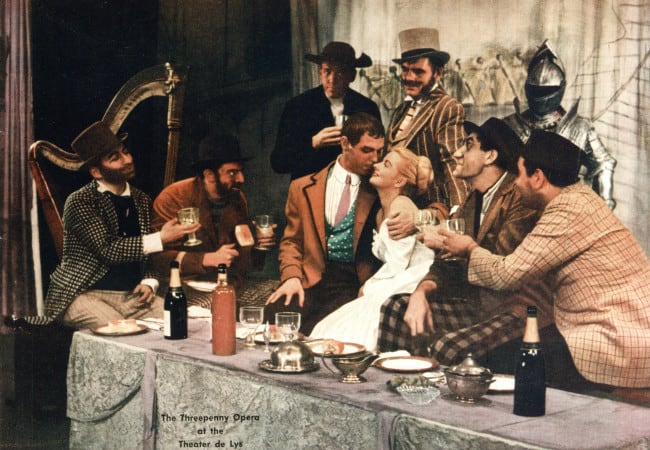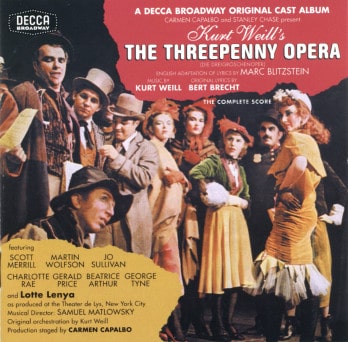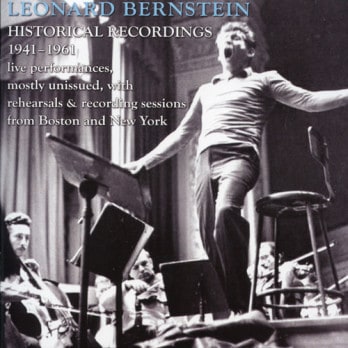Synopsis
Prologue
After the overture, the Street Singer comes onstage with a barrel organ and sings of the crimes of the notorious bandit and womanizer Macheath, Mack the Knife (“Ballad of Mack the Knife”). The setting is a fair in Soho (London), just before Queen Victoria’s coronation.
Act I
Act I begins in the shop of Jonathan Peachum (“Morning Anthem”) who controls London’s beggars, equipping and training them in return for a cut of their “earnings.” He enrolls a new beggar with the help of his wife, after which they notice that their grown daughter Polly did not come home the previous night (“Instead of Song”). The scene shifts to an empty stable where Macheath is about to marry Polly, as soon as his gang has stolen and brought all the necessary food and furnishings (“Wedding Song”). No vows are exchanged, but Polly is satisfied, and everyone sits down to a banquet. Since none of the gang members can provide fitting entertainment, Polly does it herself (“Pirate Jenny”). The gang gets nervous when Chief of Police Tiger Brown arrives, but Brown turns out to be an old army buddy of Mack’s (“Army Song”) who has prevented him from being arrested all these years. Everyone else exits and Mack and Polly celebrate their love (“Love Song”). Then Polly returns home and defiantly announces her marriage, as her parents urge her to get a divorce and Mrs. Peachum resolves to bribe Mack’s favorite prostitutes (“Ballad of Dependency”). Polly reveals Mack’s ties to Brown, which gives Mr. and Mrs. Peachum an idea about how to snare Mack, and the trio meditates on the world’s corruption (“The World is Mean”).
Act II
Polly tells Mack that her father will have him arrested. He makes arrangements to leave London, explaining his bandit “business” to Polly so she can manage it in his absence, and he departs (“Melodrama” and “Polly’s Song”). Polly takes over the gang decisively as Mrs. Peachum bribes Jenny, Mack’s old lover, to turn him in (“Ballad of Dependency” reprise). On the way out of London, Mack stops at his favorite brothel to visit Jenny (“Tango Ballad”). Brown arrives and apologetically arrests Mack, who goes to jail. He bribes the guard to remove his handcuffs (“Ballad of the Easy Life”); then his girlfriend, Lucy–Brown’s daughter–arrives and declares her love (“Barbara Song”). Polly arrives, and she and Lucy quarrel (“Jealousy Duet”). After Polly leaves, Lucy engineers Mack’s escape. When Mr. Peachum finds out, he threatens Brown and forces him to send the police after Mack. The action stops for another meditation on the unpleasant human condition (“How to Survive”).
Act III
Jenny comes to the Peachums’ shop to demand her bribe money, which Mrs. Peachum refuses to pay. Jenny reveals that Mack is at Suky Tawdry’s house. When Brown arrives, determined to arrest Peachum and the beggars, he is horrified to learn that the beggars are already in position and only Mr. Peachum can stop them (“Useless Song”). To placate Peachum, Brown’s only option is to arrest Mack and have him executed. Jenny mourns Mack’s plight (“Solomon Song”). In the next scene, Mack is back in jail (“Call from the Grave”). He begs the gang to raise a sufficient bribe, but they cannot (“Call from the Grave” part 2). A parade of visitors–Brown, Jenny, Peachum, and Polly–enters as Mack prepares to die (“Death Message”). Then a sudden reversal: A messenger on horseback arrives to announce that Macheath has been pardoned by the Queen and granted a castle and pension (“The Mounted Messenger”). The Street Singer delivers the coda (“Ballad of Mack the Knife”).
Performance materials available on rental from Kurt Weill Foundation.
Published vocal score (vocal selections) Warner Bros. SF0137.
Press Clippings
“A distinguished and delightful work of art, striking, sardonic, original, humorous and always interesting.” —New York Post, 1954
“A tour de force. Sometimes Weill writes with sangfroid, with the insolence, indifference and tired routine of any jazz hack. But you are not listening to shop-made jazz. You are listening to a master of his craft, saying in his score all sorts of things . . . with world weariness, compassion and despair, in a tonal dialect which includes some fetching tunes and some apt dissonance. . . . This opera, singspiel, what you will . . . may well last as long as its eighteenth-century predecessors.” —New York Times, 1954
“This sordid and beautiful vaudeville of life in a Victorian London slum, set to Kurt Weill’s alternating strident and plaintive music-hall melodies, does not date.” —Cue, 1954
“The Threepenny Opera resists virtue admirably.” —New York Times, 1956
“Bertolt Brecht and Kurt Weill’s seminal 1928 critique of capitalism, self-interest and the bourgeoisie suits . . . the tone of these troubled times . . . the kind of theater that shakes up an audience.” —Chicago Daily Herald, 2008
“With Brecht’s cuttingly satirical look at the meaning of morality in a society populated by gangsters, beggars, prostitutes and corrupt cops, and Weill’s edgy, opera-meets-cabaret score . . . this show was all but irresistible.” —Chicago Sun-Times, 2008
“What a treat! . . . Some of the wittiest, catchiest, most caustic odes . . . ever to grace a musical comedy . . . . There are pop-out lines (for instance, a blatant equation of bankers with criminals) that could have been written yesterday. But the undying contradiction of Threepenny Opera is that it bites the hand of the politically blasé bourgeoise while also tickling it.” —Seattle Times, 2011
“An absolute triumph . . . . A completely engaging if not always nice evening of musical theater.” —Broadway World, 2011
“The Threepenny Opera is one of those rare examples of the transformation of a great theatrical work from one era into a successful work of a later era. . . . Brecht’s social and economic preachment remains stingingly relevant to our time.” —Madison Daily Page, 2011
“Smart, sardonic and utterly entertaining.” —Madison Capital Times, 2011
Also see the Kurt Weill Foundation Threepenny Opera works page, for more information.



